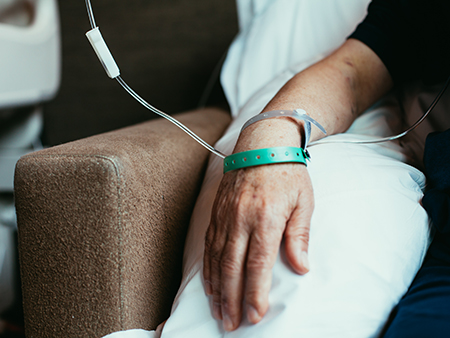
[ad_1]
The infusion of monoclonal antibodies is effective, but doctors at UAB say getting the COVID-19 vaccine is the best way to prevent someone from being hospitalized because of COVID-19.
As the delta strain of COVID-19 continues to worsen in areas with low vaccination rates, many are turning to monoclonal antibody infusion to help treat symptoms of the virus.
University of Alabama at Birmingham Professor Turner Overton, MD, says the infusion is effective; but people still need to be vaccinated to receive the strongest protection against hospitalization due to COVID-19.
 The infusion of monoclonal antibodies is effective, but doctors at UAB say getting the COVID-19 vaccine is the best way to prevent someone from being hospitalized because of COVID-19.What is monoclonal antibody infusion for COVID-19?
The infusion of monoclonal antibodies is effective, but doctors at UAB say getting the COVID-19 vaccine is the best way to prevent someone from being hospitalized because of COVID-19.What is monoclonal antibody infusion for COVID-19?
Antibodies are proteins made by the immune system to kill infections. For viruses, like the COVID-19 virus, these proteins are essential in stopping infection.
“The problem is, our immune system takes two to three weeks to make good antibodies,” Overton said. “Monoclonal antibodies are additional antibodies that can be given at the onset of infection – the first 10 days after symptoms start – to quickly bind and kill the COVID virus. This infusion can save lives if given within the first 10 days of symptoms.
How effective is it?
Overton says that infusion of monoclonal antibodies reduces the risk of hospitalization by 70 percent in high-risk unvaccinated people.
“It’s incredibly effective if given early enough,” he said.
Is it better than getting vaccinated? Do I still need to be vaccinated?
The vaccine is the best preventative infusion we have for COVID, according to Overton. Antibody therapy involves molecules that bind to and neutralize the virus. While it works almost immediately, the protection will only last a few weeks to a few months.
“Monoclonal antibodies are not as durable as the vaccine,” he said. “The vaccine trains a healthy immune system to protect against future infection, and the protection can last much longer.”
I am pregnant. Should I consider this infusion if I have COVID?
Jodie Dionne, MD, Assistant Professor at UAB Division of Infectious Diseases, says those who are pregnant and positive for COVID should consider receiving a monoclonal antibody infusion.
“Studies show [monoclonal antibody infusion] is very effective in keeping people out of the hospital when people have other co-morbidities, ”Dionne said. “Pregnancy is one of those comorbidities. The goal for these people, once diagnosed with COVID, is to get them to these clinics where they can have the antibodies to keep them out of the hospital. It doesn’t work for everyone, but we are trying to increase access for people, including pregnant women, so that they can access it if they need it. “
How do I know if I am entitled to the infusion? What do I have to do?
Overton says if you do develop symptoms, please get tested for COVID as soon as possible.
“If positive, contact your doctor to refer you for treatment with monoclonal antibodies,” he said. “There are clinics and hospitals all over the state that offer these life-saving therapies. ”
Dionne and Overton agree that while this infusion therapy is effective, being fully vaccinated against COVID-19 is the best way to reduce the risk of hospitalization.
“Please get vaccinated,” Overton said. “If we could get all Alabamians vaccinated, we could get back to normal life. ”
To schedule your free COVID-19 vaccine, visit www.uabmedicinevaccine.org.
[ad_2]
Source link